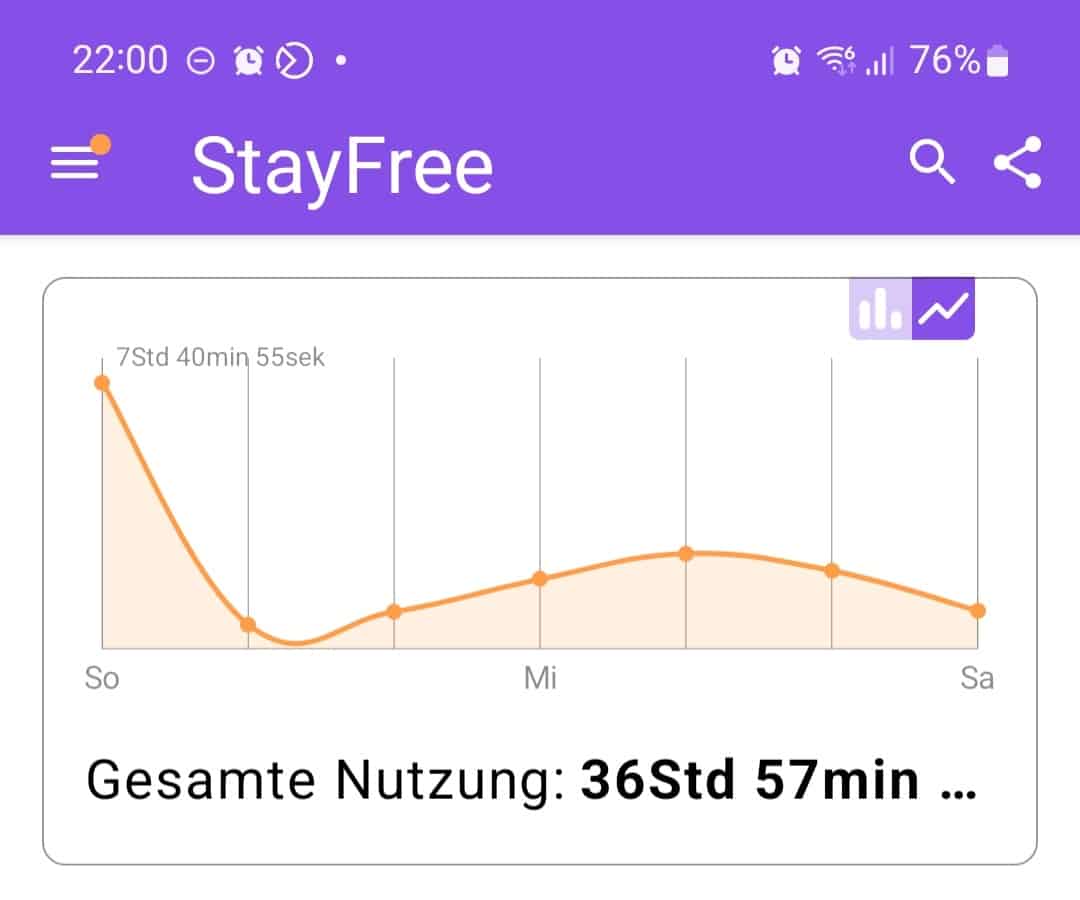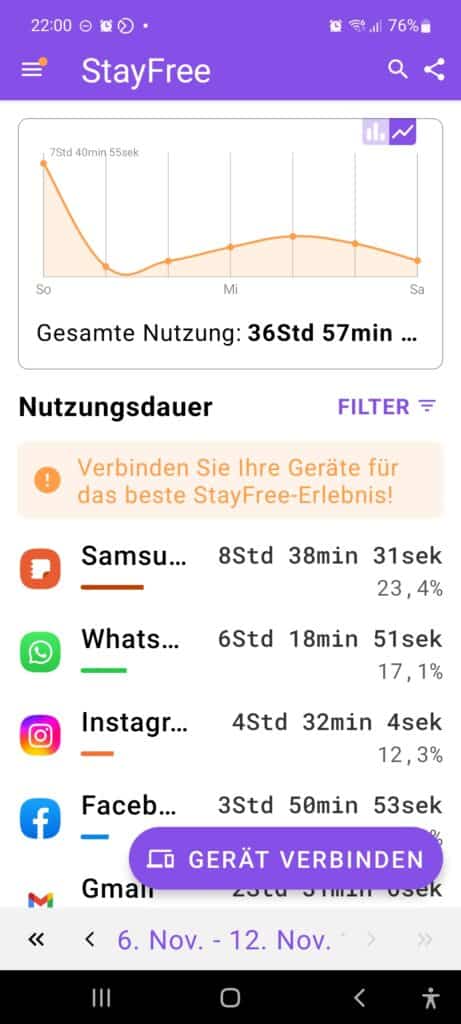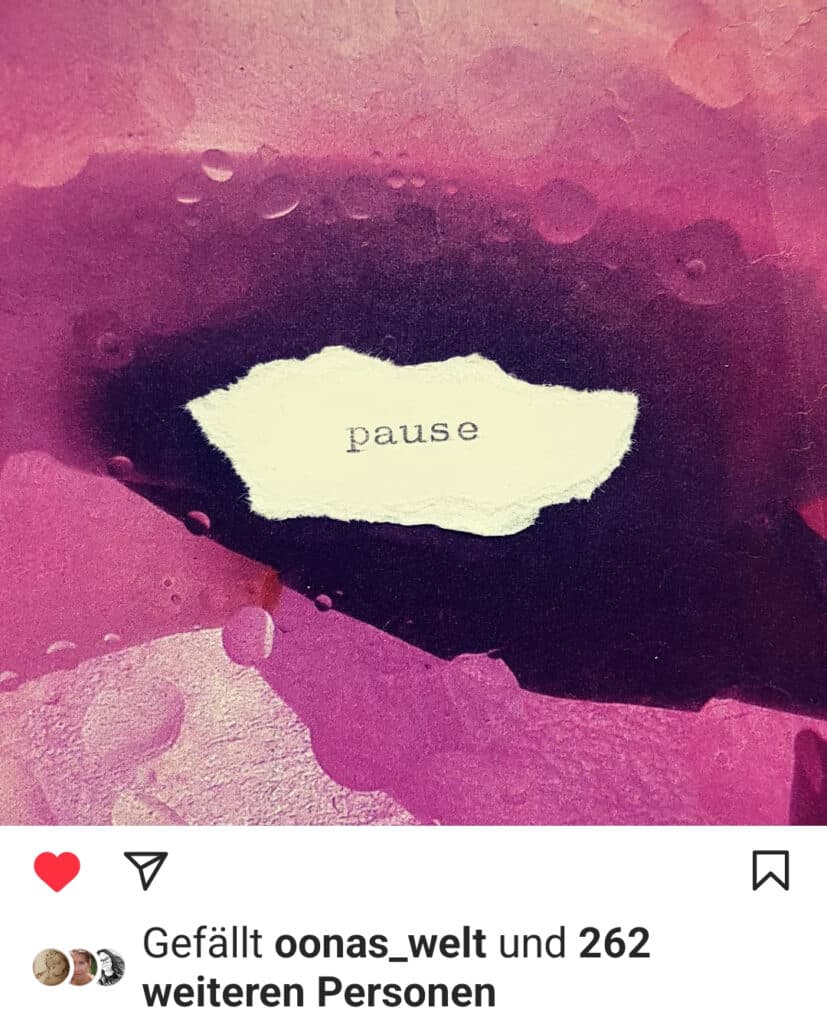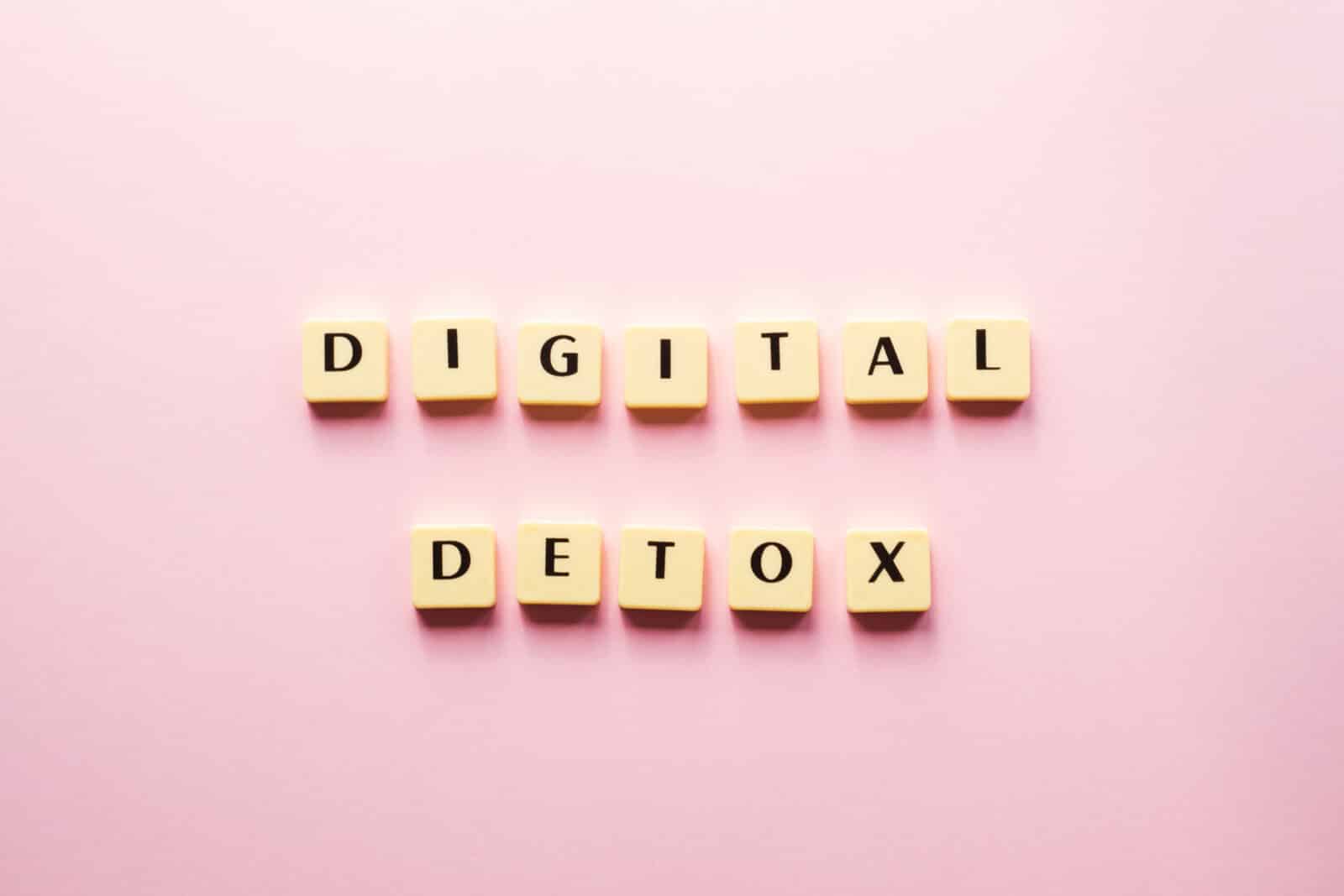Just knowing how much you consume (energy drinks, alcohol, cigarettes, drugs, online games/game arcades or sports betting, etc.) or what time-eaters you sacrifice your life time to (overtime, binge TV series watching, social media, daddling on the PC) is not enough to get to more mental health – I have now realized that quite clearly. Even if you check your cell phone usage every evening for years, as I did, and put it in the statistical context of the last week or the last 14 days… You can see exactly which apps are the big time wasters. Because confrontation does not result in change or even well-being with a situation.
That’s what this column is about:
Take Back Your Time Day
October 24 is Take Back Your Time Day, which is all about lifetime. This day of action was created in 2003 by the U.S. think tank Simplicity Forum, a group of liberal academics, authors, educators, artists, and activists, and refers primarily to the fact that Americans statistically work significantly more than is common in many other European societies.[1] But at the same time this day marks a good opportunity for all of us to question ourselves about what we spend our life time on and in which activities we spend it in a way that is unhealthy for our psyche and possibly excessive.
Example: My excessive cell phone use
I am not alone in our society with my current excessive cell phone use. But it is to the detriment of my mental health – as it is for many other people as well. Reason enough to dedicate a column to the topic and, at the same time, to start my own personal Digital Detox cure[2] – even if I initially find my necessary “outing” shameful.
Always on Schnell einen Blick riskiert. Was, kein neues Like? Kein Herz? Warum? Scheiß (!) Social Media. Immer da, aber wenn ich dich brauche, gibst du mir nicht (genau) das, was ich will.
What do I use my smartphone for?
My intensive use, which is often several hours a day, does not come from any kind of gaming, because I do not play games. I also don’t watch short TikTok or YouTube videos for amusement.
For me, the cell phone is first and foremost a work tool, as I rarely turn on the laptop. For example, if I dictate the rough versions of my articles and have them converted directly into text in my note-taking program (as I am doing right now), I save about 70 percent of the time compared to writing on the computer.
I also use it:
- for organizing my appointments and to-dos via alarm clock and calendar function
- for video calls,
- as a navigator,
- for research
- for participation in online courses and Zoom meetings,
- for networking in Facebook author groups,
- for time-shifted communication,
- to maintain individual contacts,
- to consume Facebook messages
- and Instagram and Facebook for information and networking, and for building and maintaining my account @norahille_author.
And it’s exactly this last item on my list, namely my intensive Instagram use and especially the maintenance of my account, that is causing me the most stress right now….
Doch es muss ja noch was kommen! Etwas Wichtiges, Existenzielles, das ich nicht verpassen darf. NIEMALS.
Cell phone usage time control app
When my son got his first smartphone at the end of elementary school, I installed the free app StayFree on both of our devices (hey, justice says hi!), and we still use it today. With it, you can see the total cell phone usage time at the end of the day or in between and how the time shares are distributed among the individual apps. The statistics of the last week or 14 days are also available. Additionally, it is possible to set a notification when the self-defined daily usage time has expired.
Gleich, bestimmt, ganz sicher. Es kommt, wird kommen. Und so bleibe ich dran, swipe weiter. So unendlich viele Accounts, doch immer wieder echte Perlen zwischen all dem Geschwafel und der hohlen, selbstoptimierten Glitzerwelt der Influencer.

Does the self-control work?
The idea behind it was that with this app we could both easily control our cell phone usage behavior ourselves, just on a trust basis. With him at the time, pretty much puff. He is now 14 and has been using his cell phone on his own for a long time anyway. I have to ask for the statistics of the last 14 days every eight to ten weeks.
But even for me, the oh-so-grown-up cell phone user: Puff cake… Although I have been checking my current numbers every(!) evening before going to bed since then, which is five years now, this has not changed my usage behavior. On the contrary, I have to say: it’s been MORE than scary for quite some time now. And I’m actually embarrassed to put the data here. But “watt mutt, datt mutt”, because without sincerity it can hardly become clear why action or change is so urgently necessary in my case, as has become clear to me in the last few days.
„Unfrei!“, schreit es in mir, während ich durch die News flippe, es nicht sein lassen kann.
But let’s get down to brass tacks: Give me the figures on service life!

If you decide on Digital Detox, i.e. a complete renunciation or a significantly reduced and more conscious use of electronic devices, you first need to analyze your usage behavior. How convenient that I can fall back on the aforementioned app for this.
Within the last two weeks, I’ve accumulated 114 hours and 22 minutes of cell phone use – that’s a good eight hours a day. Here’s how the stats look for my top 5 apps for this period:
- 21 hours 42 minutes Instagram
- 12 hours 6 minutes WhatsApp
- 7 hours 42 Facebook
- 5 hours 51 emails
- 5 hours 39 Google Maps
I have highlighted Instagram and Facebook in bold at the top of the list because I have identified social media – and above all Instagram – as the relevant stressors for me.
Ich spüre sie, meine innere Unfreiheit. Diese Unruhe und Atemlosigkeit. Mein Denken umkreist die Droge. Bin lost. So was von lost.
Can’t do without a cell phone?
Even in the evening while watching TV with my husband, the smartphone is behind me on the windowsill. Every now and then, I nervously pick it up to look up when an actor lived, what age rating a movie has, or if something happened on my Instagram account. I also sometimes surf in parallel to the TV news as a distraction when it is once again too hard and thus too stressful for me.
Yes, one almost asks oneself how it should have been possible for me with this intensive cell phone use of so far about 8 hours per day to take care of my two children, the husband and myself, let alone to meet further obligations or even to write articles?
The fact that it has always worked out somehow so far is probably also due to my night owlishness. I go to bed significantly later than the rest of the family, so then I often spent my time on the smartphone and “collected hours”.
Weit fliegt mein Sehnen. Aber ich bleibe doch eine ergebene Sklavin der Technik. Zu lang schon diene ich unter der selbstgewählten Knute. Bewege mich des Nachts durch Social Media wie ein Zombie.
What impact does my excessive smartphone use have on my mental health?
- During the day, I often get distracted by the smartphone.
- My concentration span has shortened significantly.
- I even check in between to see if something hasn’t happened (inner nervousness, maybe looking for the next “kick” in the form of a like or a message?).
- Quality time (reading a book, walking, dreaming) with myself too often falls by the wayside.
- Due to my excessive smartphone use, especially late at night when the family is already asleep, I often go to bed too late.
- This is, of course, counterproductive to my chronic difficulty falling asleep.
- It is sometimes incredibly difficult for me to find the jump and turn off the cell phone (for me a signal that there is an addiction or I am close to it).
Self-knowledge hurts…
When I pick up my smartphone in the presence of my family, it is sometimes considered rude. And there are also so many more smartphone hours every day than I experience in quality time together with my family. This very point hurts where I recognize it now….
Oh, du mein Smartphone wie oft ich dir huldige. Du machst mich zum Cyborg. Denn in meiner Hand verlängerst du meinen Körper. Wirst Teil meines ICHS.
Am I a cell phone or social media addict?
And just last night in bed, I thought about my once again very intense social media use, which had kept me from going to bed for almost an hour, and asked myself:
- How useful is that?
- Am I doing something good for my soul
- or am I possibly harming her?
Because whenever I’m on my cell phone, I’m not with myself, not with the people present in the same room whom I love after all, I really lose sight of myself….
Am I addicted? Or just before?
Therefore now once quite clearly said:
ME. BIN. CLOSE. VIEl. AND. CLOSE. OFT. ON. – MUCH. CLOSE. A LOT!
Especially on Insta.
And I’m probably even a social media addict… or at least almost….
Now it’s out!
Definition Social Media Addiction
According to adolescent psychiatrist Rainer Thomasius[3], the following three criteria must be met in order to speak of a pronounced social media addiction:
- “There is a loss of control over actual usage time. Sufferers have a very strong urge to be on social media all the time.” Ahem, yes… sounds familiar….
- “Other activities, whether recreational, vocational, or for young people in school, are very much neglected.” Partially true…
- “There is an increasing prioritization over other life content – social networks are becoming more important.” I also observe this tendency in myself….
Bin dir verfallen, bis heute... Viel zu oft mit dir in der virtuellen Welt. Viel zu oft dieses „Always on.“
I need to change something and urgently!
Yesterday evening in bed it was time:
I recognize that my social media use, especially on Instagram, is getting out of hand, stressing me out so that I feel driven and uncomfortable. Then I google that social media addiction can lead to depression – an equal phase started for me as part of my bipolar disorder about three weeks ago. Possibly it is amplified by my excessive cell phone use?
So I come to the realization: I don’t want to be externally determined to this high degree by an electronic device. With my intensive cell phone use, especially Instagram, I am clearly damaging my well-being, my inner balance and thus my mental health.
Start of my Digital Detox cure
And I make – drum roll(!) – directly in the evening in bed the decision for cell phone and social media detox, which will look like this for me individually:
- Using the wellness function, I define the daily maximum usage time for my phone at 4:30h – for me, already a significant improvement compared to around 8h.
- For Instagram, I set a maximum duration of 45 minutes within this 4:30h, after which the app is inactive for the rest of the day.
- I also set a bedtime from 8pm to 10am using the wellness feature on my phone. Then the screen looks very gray and tired, which shows me that I don’t really want/shouldn’t use it.
- And since I had my phone so far upstairs next to the TV and later as an alarm clock in the bedroom, I would like to introduce a change here too: From now on, the phone sleeps from 20 h downstairs with the airplane mode set in the kitchen and I use an alarm clock again to get up.
- All push notifications except WhatsApp are turned off.
- When going for a walk, to the cinema or to a restaurant, the cell phone stays at home.
Doch es geht auch ohne Dich. Weil ich es will. Mich frei träume. Dich loslasse. Meine Augen vom Bildschirm abwende.
Can I do it?

Let’s see what these changes bring… I’m already a bit excited, because the line between cherished habit and real addiction is very thin. Can I really be that consistent and get by with 45 minutes of Insta a day? And how will I even cope with reduced cell phone usage time and especially my social media detox?
Withdrawal symptoms from social media addiction?
And what I’m already very curious about: social media addiction is ultimately an addiction like any other. If I cut down my cell phone use behavior this much now, will I have withdrawal symptoms? And if so, which ones?
Or do I just suddenly have a lot more time for my family, for myself, for writing, for painting, for chatting with girlfriends and for reading books?
Mein Blick gleitet tastend ins Außen. In die Wunder der herbstlichen Natur.
Study withdrawal symptoms from social media addiction
In 2018, a study on “Cyberpsychology, Behavior, and Social Networking”[4] took place in which 152 people between the ages of 18 and 80 (70% of whom were women, by the way) were assessed on their social media use and possible addictive behaviors for one week. Often, this seven-day complete exclusion from social media platforms such as Facebook or WhatsApp was enough to trigger withdrawal symptoms, much like those seen in drug addicts:
- Significantly increased craving for the drug,
- Boredom,
- Influence on mood.
Incidentally, 90 of the 152 study participants relapsed within the week. To this end, the article on the study states, “Although this occurred infrequently (less than twice on average) and for short periods of time (three minutes on average), nearly 60 percent of the subjects ‘cheated’ during withdrawal and had relapsed.”[5]
How do I want to use my phone and Instagram in the future?
Can I resolve my personal stress related to my Instagram account through my Digital Detox regimen? Come to the realization that posting back and forth on a whim is just allowed to be fun and feel free of obligation? That I don’t have to do everything that’s required in visibility challenges up to and including a daily 15-second video? That I manage to block out the fixation on follower growth?
This last thought in particular is quite wonderfully supported by a quote from Editor-in-Chief Kinga Bartczak in her article on Social Media Fatigue:
Heterogeneity and distinctiveness do not come from collecting likes. Don’t focus on the 99 percent who don’t know you, focus on the one percentage point that matters to you.[6]
Kinga Bartczak
Gain Mental Health through Digital Detox
Author and coach Alia Cardyn names the following as positive effects of a balanced use of digital devices in her exercise booklet “Digital Detox – simply switch off more often”[7]:
- More time,
- a more relaxed everyday life,
- a more efficient brain,
- more productivity through more uninterrupted time,
- better sleep,
- increasing efficiency and well-being as one thing is done at a time,
- better self-awareness,
- be more present to life.
Conclusion
So far, my Digital Detox has been working quite well for a month, I usually get by with the 4:30h maximum cell phone usage per day, rarely it becomes 5h. And so my wish seems to be coming true: I am in the process of finding a better, healthier way of dealing with social media for myself. In any case, after my detox experiment, I find the wellness function on my cell phone to be a lasting help. I hope that the set maximum cell phone usage time and especially the daily Insta reduction to a maximum of 45 minutes will help me not to fall back into my old addictive or addiction-like behavior.
Bartczak also commented on this in her article: “I never tire of passing on this tip – block out fixed social media slots. These can be customized, but should not exceed a certain time frame (for example, one hour) (unless you are an influencer). We get lost so quickly in this never-ending world of glitter, but the time lost wallowing in admiration for others and longing for a ‘better’ life is never given back to us.”[8]
Ich rieche die feuchte Erde, den leicht modrigen Duft zusammengefegter Laubhaufen. Spüre sanft die Oktobersonne auf meiner Haut. Und weit fliegt die Sehnsucht.
[1] Giese, Sven: Take Back Your Time Day in the USA. Curious holidays. 2015. Source: https://www.kuriose-feiertage.de/hol-dir-deine-zeit-zurueck-tag/ (Accessed: 24.10.2023)
[2] This took place in October-December 2022, where I drafted the text for this column as a rough draft. I’ve been using my smartphone’s wellness settings permanently ever since, including the ability to define maximum time per app per day.
[3] RTL News, February 6, 2020 at 12:07 pm. “First signs and what you can do about it. How can I tell if I’m addicted to social media?” Available at: https://www.rtl.de/cms/woran-erkenne-ich-ob-ich-suechtig-nach-social-media-bin-4482399.html (Accessed: 10/24/2023).
[4] Stieger, Stefan and Lewetz, David: “A Week Without Using Social Media: Results from an Ecological Momentary Intervention Study Using Smartphones.” In: Cyberpsychology, Behavior, and Social Networking, vol. 21, no. 10 (Oct. 16, 2018). Available online at: (Accessed: 10/24/2023).
[5] An article about the study states: “Even a brief abstinence from social media causes withdrawal symptoms.” Published online in Psylex – Latest news in psychology, November 14, 2018. © PSYLEX.com – Credit: Cyberpsychology, Behavior, and Social Networking (2018). DOI: 10.1089/cyber.2018.0070. Available online at: https://psylex.de/sucht/internet/social-media-entzug/ (accessed: 10/24/2023).
[6] Bartczak, Kinga: “Life as an Accessory – How Do We Escape Social Media Fatigue?” Published at femalExperts on March 22, 2022. Available online at: https://femalexperts.com/wie-entkommen-wir-der-social-media-fatigue/ (accessed: 10/24/2023).
[7] Cardyn, Alia: “The little exercise book. Digital Detox – simply switch off more often”. Munich, 2016.[8] Ibid.
About the author
Nora Hille was born in 1975, is happily married and has two children. She studied history, literature and media studies, worked in communications/public relations for 12 years and has now retired for health reasons. Today she writes articles on the topics of mental health and mental illness as a sufferer and experience expert. She also writes literary essays, poems (preferably haikus) and short prose. She regularly publishes her mental health column here at FemalExperts Magazine and is Editor of eXperimenta - the magazine for literature, art and society. Anti-stigma work is close to her heart: she is an encourager at Mutmachleute e.V. and is committed to Anti-Stigma-Texts against the stigmatization (exclusion) of the mentally ill in our society for more togetherness, tolerance and equality. In autumn 2023 her book "When Light Defeats Darkness" will be published by Palomaa Publishing. A book of encouragement about how to live a good and rich life despite bipolar illness - and the enormous challenge that this means every day for the inner balance of those affected.
- 20. November 2022










